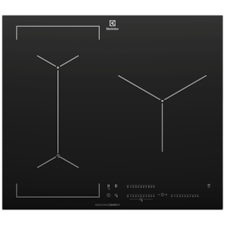Using cast iron cookware on ceramic-glass stoves and cooktops is perfectly safe, provided you set it down gently on the cooktop and always lift it when repositioning, rather than dragging it. Let's delve into our step-by-step guide to navigate this culinary challenge.
Step-by-step guide to use cast iron on glass-top stove safely
1. Ready your cast iron cookware
- Inspect the bottom: Before you even think of placing your cast iron on the stove, inspect the bottom. Ensure it's free from any debris, rough edges, or burrs. A smooth surface is crucial to prevent any potential scratches on the glass.
- Seasoning matters: A well-seasoned cast iron not only enhances your cooking but also provides a smoother surface, further reducing the risk of scratching.
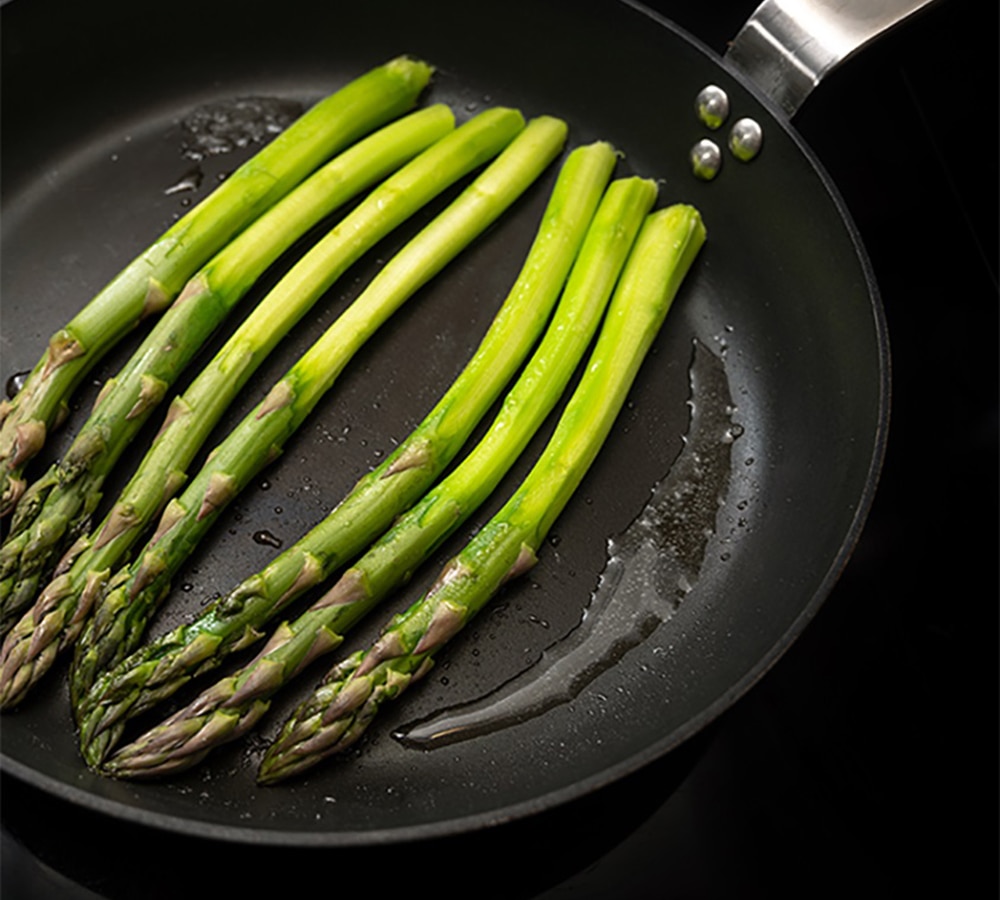
Seasoning is necessary to protect the super non-stick powers of your cast-iron skillet
Read more:
- Induction hob, gas hob or ceramic hob
- Induction cooktop vs Radiant cooktop: A comprehensive comparison
2. Choose the right cooking temperatures
- Start slow: Begin with a low heat setting and gradually increase it if necessary. Cast iron retains heat exceptionally well, so there's rarely a need for high temperatures.
- Monitor continuously: Keep a close eye on your cooking. Since cast iron distributes heat evenly, it might require less cooking time than you're used to, especially on a glass-top stove.
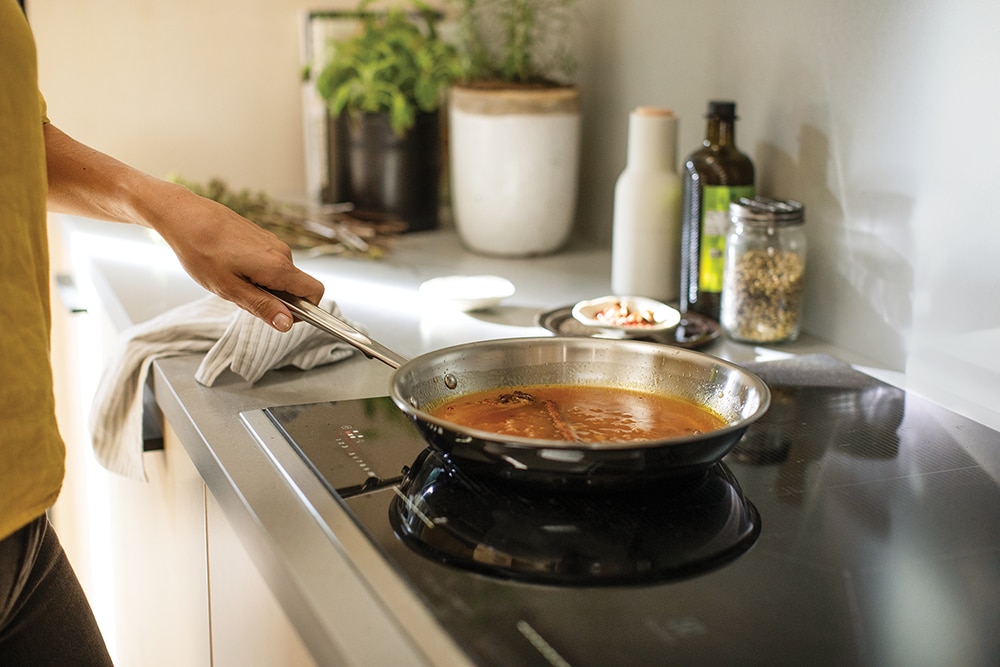
Make sure to start cooking with a low heat setting and gradually increase it if necessary
3. Handle with care
- Lifting technique: Given the weight of cast iron, always use both hands when lifting or moving the skillet. This ensures you have full control, reducing the risk of accidental drops or hard placements.
- Avoid sliding: It might seem obvious, but it's worth reiterating. Never slide your skillet. Always lift.
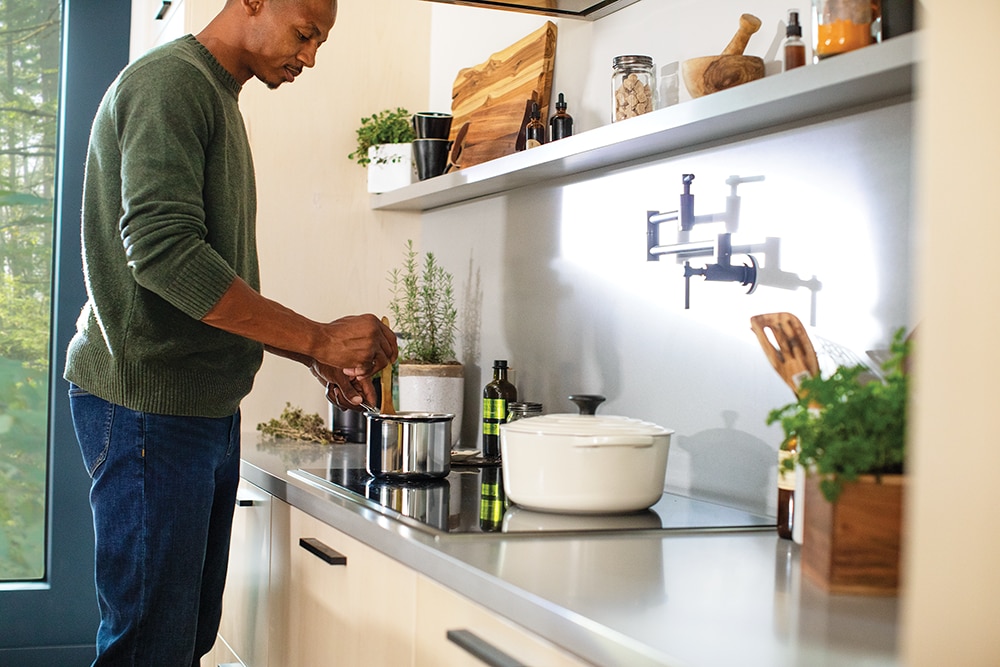
Handle your cast iron cookware with proper lifting technique and avoid sliding
4. Remove promptly after cooking
- Cooling off: While it might be tempting to leave your skillet on the stove to cool down, it's best to remove it once you're done cooking. This not only protects the glass but also allows your skillet to cool down uniformly.
- Use trivets: If you're concerned about where to place your hot skillet, consider using a trivet or a heat-resistant mat.
5. Clean immediately after use
- For the skillet: Once you've finished cooking, let your skillet cool down a bit, then clean it using minimal soap and a soft brush. Remember to dry it thoroughly to prevent rust.
- For the stove: Glass-top stoves can show stains and spills quite prominently. Use a soft cloth or a designated glass-top cleaner to ensure it remains spotless and shiny. Check out more tips on how to clean gas stove in our article.
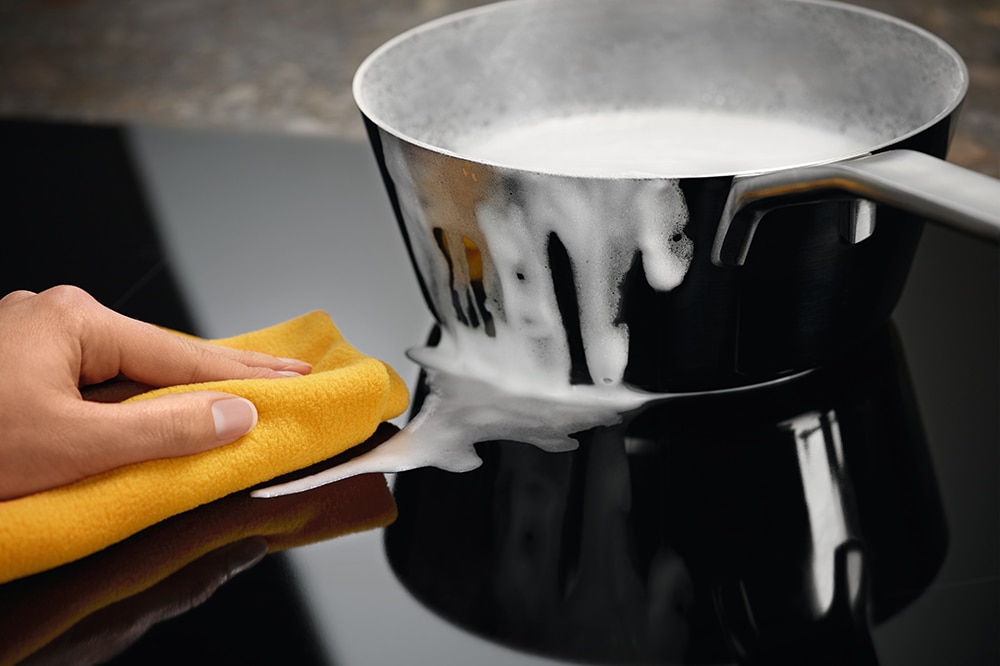
Clean your glass-top stove immediately after use
Tips to avoid scratches & stains when cooking with cast iron on glass surfaces
Here are some essential tips to ensure your cooking sessions leave no unwanted marks:
1. Use a heat diffuser
A heat diffuser acts as a protective barrier between the cast iron and the glass surface. It distributes the heat evenly, ensuring consistent cooking and reducing the direct contact of the skillet with the glass.
2. Regularly check the bottom of your cast iron
Over time, food particles and other debris can accumulate on the bottom of your skillet. Regularly checking and cleaning the base ensures a smooth contact surface, reducing the risk of scratches.
3. Avoid rapid temperature changes
Glass surfaces can be sensitive to sudden temperature changes. Avoid moving your cast iron skillet from a very hot burner to a cold surface or vice versa. Allow the skillet to cool down gradually to prevent thermal shock.
4. Opt for enamel-coated cast iron
If you're in the market for new cookware, consider enamel-coated cast iron. It offers the benefits of traditional cast iron but with a smoother surface that's gentler on glass cooktops.
5. Be mindful of spillages
Cast iron can retain heat for extended periods, which can cause spillage to burn onto the glass surface. If you notice any spills, clean them promptly. Burnt-on residues can be harder to remove and might require special cleaning agents.
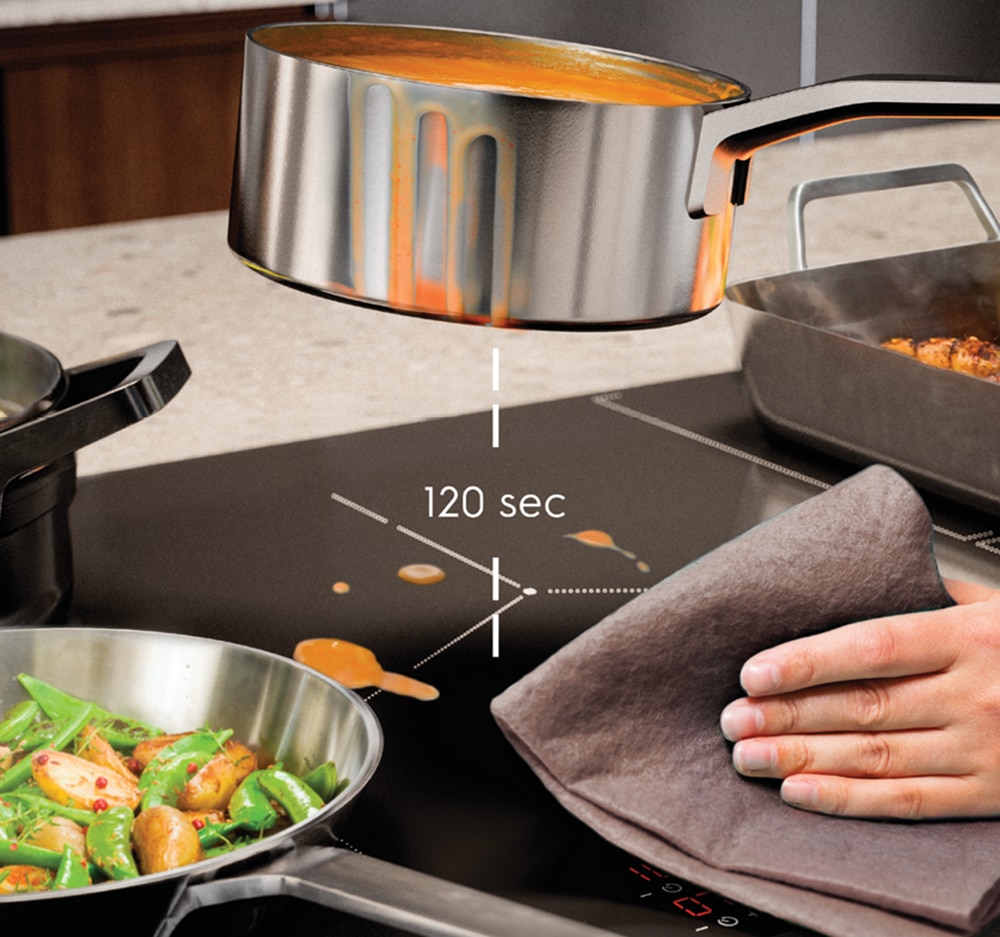
Clean spills promptly otherwise burnt-on residues can be harder to remove
Read more:
- How to clean your induction and radiant hobs at home
- Stove sizes and dimensions guide: How to find the right one
Experience superior cooking with Electrolux stoves & hobs
At Electrolux, we've always been inspired by the needs of our users, blending quality with innovation. Our range of stoves and hobs is a testament to this commitment, designed with the modern kitchen in mind. Here's a glimpse into what makes them special:
High-quality glass cooking surfaces
Our stoves and hobs come with glass surfaces that are not only pleasing to the eye but also designed for easy maintenance. We've taken care to ensure their durability, reducing the chances of scratches and ensuring they stand the test of time.
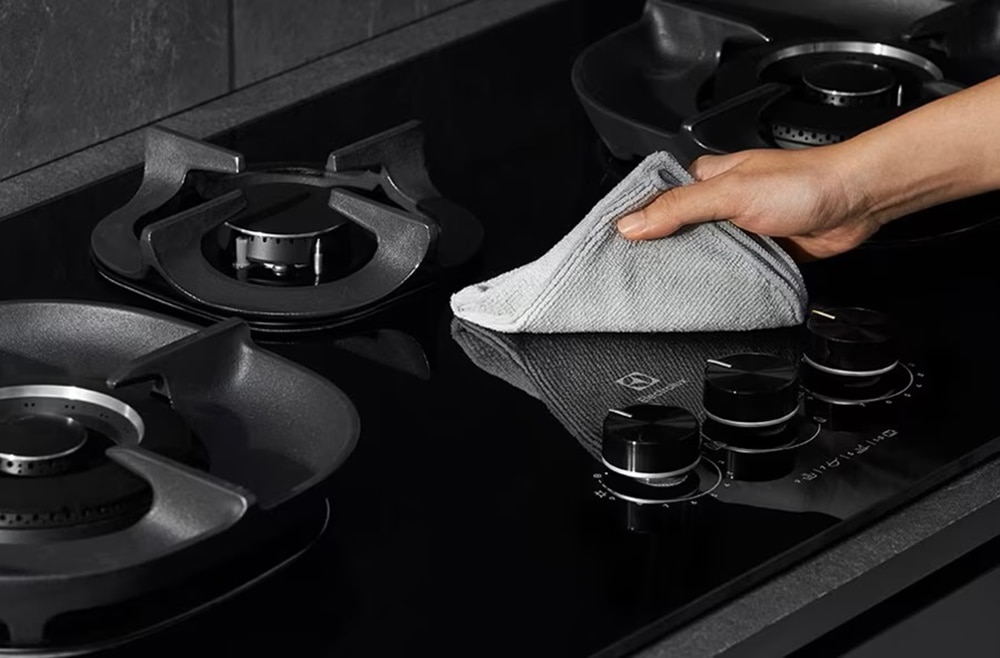
Sensitive touch controls
We believe in simplicity. Besides traditional knobs, we also equip our cooktops with intuitive touch controls, allowing for precise adjustments with just a gentle touch.
Induction technology
Safety and efficiency are at the heart of our induction technology. It focuses heat directly under the pan, leaving the surrounding area cool to the touch. And those accidental spillages? They're less likely to become burnt-on residues.
Energy efficiency
We understand the importance of being eco-friendly. Our induction hobs not only heat up quickly but are also designed to be energy-efficient, letting you prepare your cherished dishes efficiently.
Explore our best-selling gas stoves and induction hobs:
-
- StepFlame settings deliver precise heat control.
- FlameShield improves efficiency and results.
- Intense 5.2kW burner to lock in flavours.
-
- FlameShield improves efficiency and results.
- High power burner is ideal for stir-frying.
- Flame failure cuts off gas supply for your safety.
-
- SenseFry adjusts heat for even frying results.
- Select the bridge function to combine two zones.
- PowerBoost provides quick, intense heat.
-
- SenseFry adjusts heat for even frying results.
- PowerBoost provides quick, intense heat.
- Flexi cut-out for easy kitchen installation.

Check out this video to learn more about UltimateTaste 700 induction hobs, which unleash your cooking techniques with advanced features:
Read our Stove & hob buying guide to buy a perfect stove for your kitchen.
FAQs when using cast iron on glass-top stoves & hobs
-
1. Which cookware should I avoid on a glass top stove?
Avoid using cookware with rough bottoms, like stoneware, or those with a warped base. These can scratch or not sit evenly on the glass surface.
-
2. How do I prevent thermal shock with cast iron on glass?
Always allow your cast iron to heat up and cool down gradually. Avoid placing a hot skillet on a cold surface or vice versa.
-
3. What's the best way to safeguard my glass-top stove from cast iron?
Use a heat diffuser between the stove and the skillet, and always lift the skillet instead of sliding it.
-
4. Can a cast iron skillet scratch my glass top stove?
Yes, if not used carefully. Always ensure the bottom of the skillet is clean and smooth, and avoid dragging it across the stove.
-
5. Are there alternatives to cast iron for glass-top stoves?
Certainly! Consider using stainless steel, titanium, or copper-based cookware. These are less abrasive and are suitable for glass-top stoves.
-
6. Is a flat-bottomed cast iron pan necessary for a glass-top stove?
Yes, a flat bottom ensures even heat distribution and reduces the risk of scratching or cracking the glass surface.


